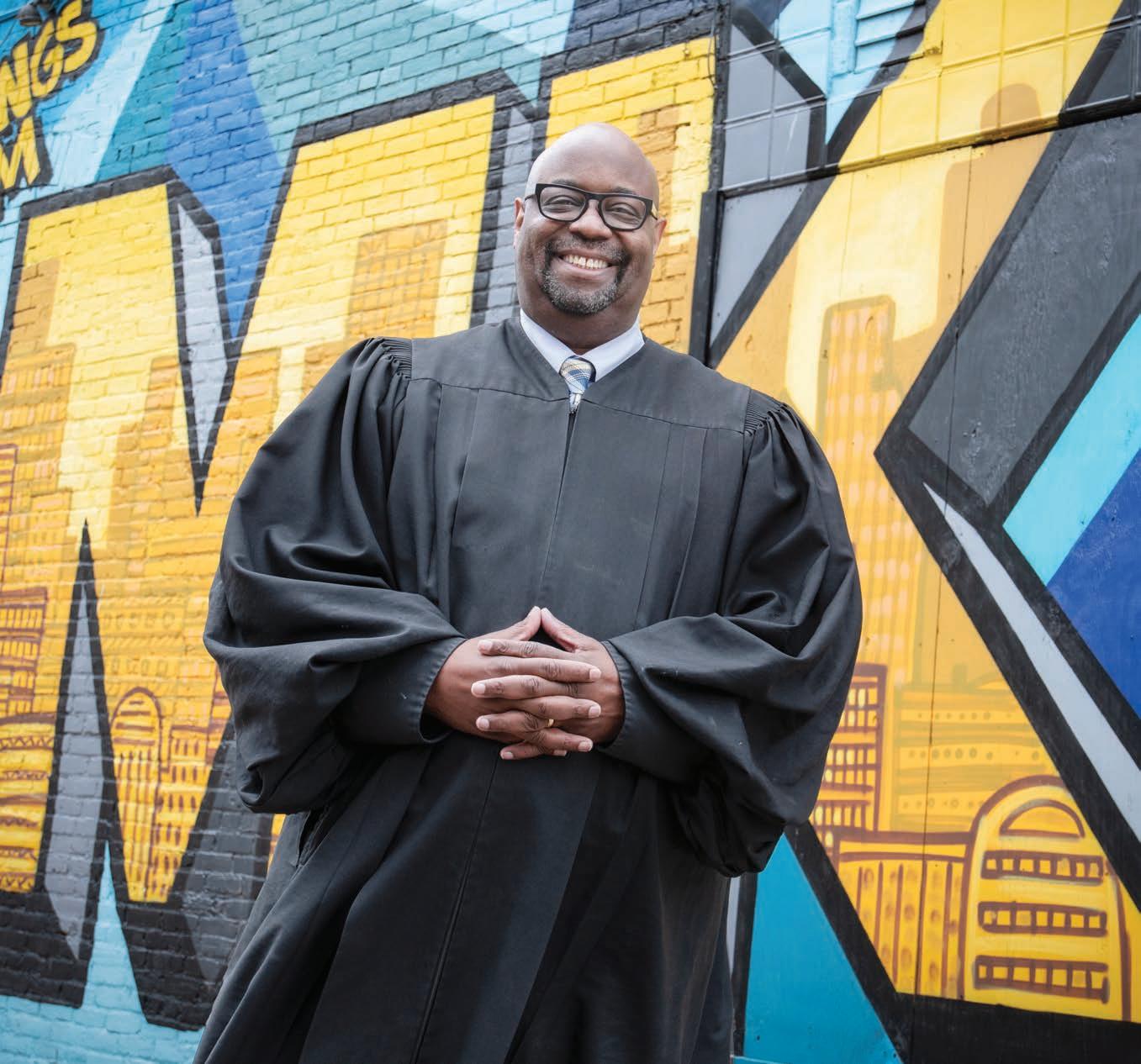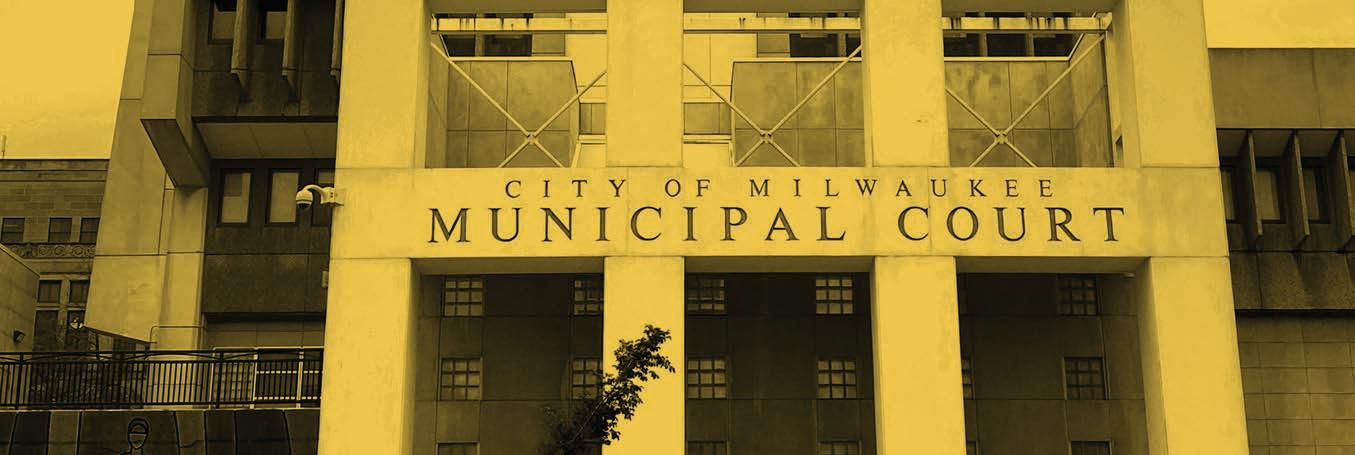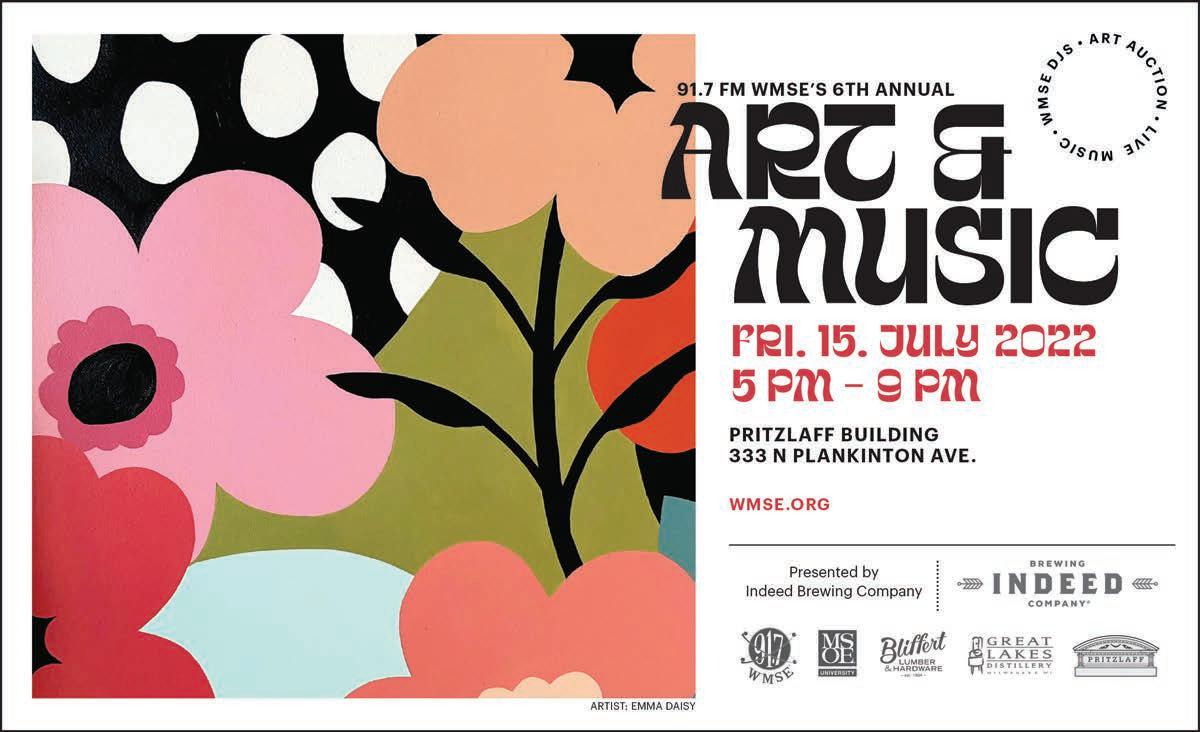
9 minute read
Milwaukee's Derek Mosley is a Judge for All
MILWAUKEE’S DEREK MOSLEY IS A JUDGE FOR ALL SEASONS
You ran a red light or got pulled over for speeding by a city cop. Next thing you know you’re standing in front of Municipal Judge Derek Mosley in his municipal court. After determining your fine, he might help you get a job. Do you want to get married? He will officiate at your wedding. How about a new restaurant for your dining pleasure? Judge Mosley will tell you where to go to enjoy great food in Milwaukee, even show you pictures of the meals. Or maybe you’d like a lesson in American history. The judge will deliver a lecture on Understanding Unconscious Bias for your civic group or church.
Advertisement
Brimming with charisma, he exudes an attitude built on optimism, and he laughs a lot. Throughout our discussion, it became clear that Mosley loves Milwaukee
Now 51, Mosley grew up on Chicago’s South Side. His dad was an engineer for Illinois Bell. His mom was a secretary at Governors State University. He graduated from Marian Catholic High School in Chicago Heights, did his undergraduate college degree in Iowa and received a full ride scholarship to Marquette Law School. He graduated in 1995.
What was your first job out of college?
My goal was to be a public defender in Milwaukee, but there were no openings. District Attorney E. Michael McCann wanted to hire me as a prosecutor, but I said I’d rather be a public defender, that I wanted to help people. He told me, “When you are a public defender, you have to ask the prosecutor, ‘Hey, would you do this for my client?’ When you’re a prosecutor, you just do it.” That sold me. I worked as a prosecutor for eight years doing misdemeanors, felonies, and general crimes. But I fell in love with children’s court because I was dealing with juveniles who looked like me, Black and brown kids. Everybody else in the courtroom was white. For a Black kid to see a Black adult in the system gives him hope to be treated fairly.
How did you end up becoming a judge?
My mentor was the Black [Municipal Court] Judge Louis Butler. He later served on the Wisconsin Supreme Court. In 2002, Judge Butler told me he was running for Circuit Court Judge. He encouraged me to seek his Municipal Court Judge position. When I was coming up through the ranks, if you were a Black attorney, you found out about openings after they were posted. White attorneys got wind of openings six months before they were posted. After Judge Butler left, the Common Council appointed me to be the Chief Judge of the City of Milwaukee Municipal Court in the middle of the term. I won the next election. Every four years, I have to run again to keep my seat.
As a municipal judge, you don’t deal with felons, but what about the minor crimes that do not dominate the news? What kind of cases do you handle?
I handle minor infractions like parking tickets all the way up to vandalism, assault and batteries, disorderly conduct, building and health codes and also OWI’s. But currently, most cases are about traffic violations, reckless driving, running red lights.
As a municipal judge, how do you decide on what the fines should be?
Every time a police officer writes a ticket, there is a forfeiture amount on that ticket. For instance, if you get a disorderly conduct ticket, the citation amount is $187. But I have the discretion to go as high as $500. I base the fine on the defendant’s prior record and whether they show contrition.
What is considered disorderly conduct?
That particular statute reads—"Being loud, abusive, profane, boisterous, or otherwise disorderly that tends to cause or provoke a disturbance.” Examples are bar fights, arguments between neighbors, fights in schools.
How do traffic tickets get settled?
When you are stopped, a police officer hands you a ticket with a court date. You can call the court and set up an appointment. You can appear in court in person or log onto Zoom. Let’s say the charge is speeding 20mph over the limit. I ask you for your plea, guilty or not guilty. If not guilty, I set a date for you to meet with the prosecutor to work out a deal. If guilty, I pose a fine. The big issue can be the matter of points assessed to your driver record.
I suspect you need to have a lot of experience to make these judgement calls.
Of course, but much of my experience comes from living in the city. As a municipal judge, I am required to live in the municipality of where I work. When I was in the District Attorney’s office, we started the Community Prosecution Unit. DAs were assigned to a neighborhood association and to a police district. I was assigned to the Black Harambee neighborhood and the Williamsburg Heights neighborhood. That’s how I learned about Milwaukee. This program still goes on. DA’s meet the people in their own neighborhoods.
Are traffic tickets rampant? In my experience, the most dangerous streets for driving are 35th and 27th from the 94 freeway up to Capital Drive in the north.
You are right. Also, Fond du Lac, Sherman Boulevard and Layton. I see a lot of violations happening on those streets. Right now, traffic tickets are very concerning. Running red lights, passing on the right, speeding,
What do you do with repeat offenders?
Here is how traffic tickets work. Every moving violation has points. Once you exceed 12 points, you lose your license. For repeat offenders, I tend to increase the fines and the points. You can lose your license for six months, a year, even five years.
Does being a judge ever get discouraging? You are dealing with people who are sometimes living on the edge.
Almost every driver clearly knows they can get a ticket for speeding. So I ask them, “Why are you doing this, especially when it affects your job?” That part is discouraging. Young people generally get to be old enough where obeying the law makes sense to them. For example, you could get a good paying job with Amazon, but your driving record is awful, and then you don’t get that job because you do not qualify.
What kind of juvenile cases do you deal with?

Many of those cases happen in schools. Truancy, disorderly conduct, curfew violations, or traffic offenses by kids who have never had a driver’s license. Once, I had a young man about 16 who had two speeding tickets. He did not have a license. I asked him why. He said, “I don’t need a driver’s license to drive. I just need a car.” That stuck with me.
What kind of punishment do you give for kids fighting in schools?
If they can’t pay the fine, they do community service. The Social Development Commission puts them through a program of community service, maybe doing work in their schools or picking up trash.
There is an impression among many white residents that the central city harbors lawbreakers. I’ve spent a lot of time on the inner city streets, and I can say that 99% of Black residents want safe neighborhoods. Is Milwaukee doing enough to control and prevent crime?
Your statement is 100% correct. When I worked as a prosecutor in the Harambee neighborhood, for instance, a lot of Black residents would ask if we could put a cop on every corner and have the cop just sit there all day.
As for the crime issue, consider this: We put so many barriers on certain residents for them to change their ways. For instance, if you’ve been convicted of a felony, it’s difficult to get a job because that is always on your record. Also, there are not many good jobs located in the central city. The good jobs are located in the suburbs.
I’d like to talk about your other interests. Starting with food, which is your favorite subject, right? How did you become a food influencer?
It started out on Facebook where I was posting work things like new law changes, and I signed them “Your friendly neighborhood judge.” My followers liked those updates. Then, I started posting information about Job Fairs like at Amazon or IKEA. This all gave me a lot of followers. Meanwhile, I was eating at all kinds of restaurants and taking pictures of the food and posting them on Facebook, suggesting my followers give each restaurant a try. I got Black people going to parts of town they wouldn’t normally frequent—and white people doing the same. Also, every February, I do daily posts on Black history, everyday a different fact. That has gotten me a national following. All those demographics have turned into me being a food influencer because everybody loves food.
In Milwaukee, there are a lot of chefs opening up their own places—Spanish, Portuguese, African, Korean, Jamaican, Ethiopian. I eat out two or three times a week for breakfast, lunch or dinner. If you want to meet me for a business lunch, we will meet at a restaurant you haven’t been to. Might be Peruvian or Puerto Rican.
On another platform, you are the wedding king, and you have officiated more than 1,000 weddings over 20 years. How did that come about?
That is one of my judge responsibilities—marrying people doing civil weddings in the civil court. Eight years ago, I was diagnosed with end-stage renal disease. The doctors told me if I didn’t get a kidney transplant, I was gonna die. For two years, I had to do dialysis for 10 hours each night of the week and it was dejecting. I looked forward to weekends when I could do weddings where everyone was happy. I started at 10 weddings, then I did 20, then 40, and so on. After I got the kidney transplant, I was able to do more weddings. I might do from 50 to 100 weddings per year.
I asked Judge Mosley if I could take his portrait, and he gladly agreed but made a caveat that he needed to wear his trademark black robe.
I wear my robe every opportunity I get because there are too many pictures of Black and brown men in orange jumpsuits. I wear the robe for what it represents. On my bench, I have blind Lady Justice holding the scales of justice. Right at her feet, I have an actual pair of shackles. Why do this? Because it reminds me that for me to be sitting on this bench—my ancestors, my own blood survived slavery, emancipation, reconstruction, the Black codes, lynchings, loss of culture, the Civil Rights Movement, and all of that just so I had the opportunity to be a judge and wear the black robe.













